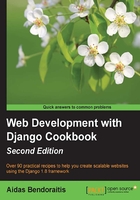
Preface
Django framework is relatively easy to learn and it solves many web-related questions, such as project structure, database object-relational mapping, templating, form validation, sessions, authentication, security, cookie management, internationalization, basic administration, interface to access data from scripts, and so on. Django is based on the Python programming language, where the code is clear and easy to read. Also, Django has a lot of third-party modules that can be used in conjunction with your own apps. Django has an established and vibrant community, where you can find source code, get help, and contribute.
Web Development with Django Cookbook - Second Edition will guide you through all the web development process with Django 1.8 framework. You will get started with the virtual environment and configuration of the project. Then, you will learn how to define the database structure with reusable components. The book will move on to the forms and views to enter and list the data. Then, you will continue with responsive templates and JavaScript to create the best user experience. After this, you will find out how to tweak administration in order to make the website editors happy. You will also learn how to integrate your own functionality in Django CMS. The next step will be to learn how to use hierarchical structures. You will find out that collecting data from different sources and providing data to others in different formats isn't as difficult as you thought. Then, you'll be introduced to some programming and debugging tricks. Finally, you will be shown how to test and deploy the project to a remote dedicated server.
In contrast to other Django books, this book will deal not only with the code of the framework itself, but also with some important third-party modules that are necessary for fully-equipped web development. Also, the book gives examples of rich user interfaces using Bootstrap frontend framework and jQuery JavaScript library.